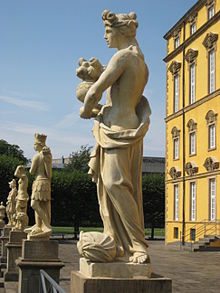Jean Baptiste Farinelli
Jean Baptiste Farinelli , also Jean-Baptiste Farinel , (born January 15, 1655 in Grenoble , † after 1720 in Venice ) was a French violinist , concertmaster and composer of the Baroque . In the second half of the 17th century in particular, he played a major role in the boom in musical life in Hanover . Farinelli's older brother was the composer and violinist Michel Farinelli .
Life

family
Farinelli came from a traditional French family of musicians in the 17th and 18th centuries. He was the son of Robert Farinel and brother of Michel Farinel .
Career
Farinelli and his father had already moved to the royal seat of Hanover in 1680 at the time of the Principality of Calenberg . In the same year Farinelli became concertmaster of Duke Ernst August's court orchestra .
On January 8, 1689, Farinel married the Italian soprano Vittoria Tarquini in Copenhagen , who, together with other singers, came to Ernst August's court in the summer or autumn of 1688 to sing Enrico Leone in Agostino Steffani's opera (first performed on January 30, 1689 in Hanover).
From 1691 to 1695 Farinelli was “probably” active in the courtyard of Osnabrück , where he witnessed the rise to the electorate of Hanover under Ernst August and his wife Sophie von der Pfalz . During this time Giuseppo Galloni represented Farinelli at the court of Hanover.
Subsequently, Jean Baptiste Farinelli, back in Hanover, was the "director of instrumental music" until 1713 of the 18-member Hanoverian court orchestra, only in 1710 and 1711 he was represented there by Georg Friedrich Händel . During a trip to Denmark , Farinelli was “ nobilitiret ” there by Frederick IV , King of Denmark and Norway .
When Georg Ludwig ascended the English throne in London at the beginning of the personal union between Great Britain and Hanover in 1714 , he appointed Farinelli as Hanoverian Minister-Resident or Envoy in Venice . Farinelli was dismissed from the Hanoverian service in 1720 and died in Italy "after 1720". Meanwhile, Francesco Venturini had taken up the position of court concertmaster in Hanover .
Farinelli's compositions - especially stage works and flute concerts - are "not preserved".
See also
- Exhibition When the Royals came from Hanover . Hanover's ruler on England's throne 1714-1837 as part of the Lower Saxony State Exhibition 2014
literature
- Victor Herrero Mediavilla (Red.): Archivo biografico de España, Portugal e Iberoamerica ( ABEPI = Spanish, Portuguese and Iberoamerican Biographical Archives), microfiche , Munich; New York; London; Paris: Saur
- Johann Gottfried Walther : Farinelli. In: Musicalisches Lexicon or musicalische Bibliothec , Leipzig: Wolfgang Deer, p. 240; Digitized via archive.org
- George Grove : New Grove Dictionary of Music and Musicians , vol. 6, p. 397
- Riemann Musiklexikon , 12th, completely revised edition in 3 volumes, ed. by Wilibald Gurlitt , Vol. 1, Mainz; London; New York; Paris: Schott, p. 488f.
- Wulf Konold (Ges.-Red.), Klaus-Jürgen Etzold (co-author): The Lower Saxony State Orchestra Hanover 1636 to 1986 , ed. by the Lower Saxony State Orchestra Hannover GmbH, Hanover: Schlütersche Verlagsgesellschaft, 1986, ISBN 3-87706-041-2 , p. 174
- Hugo Thielen : FARINEL (LY), Jean-Baptiste. In: Dirk Böttcher, Klaus Mlynek, Waldemar R. Röhrbein, Hugo Thielen: Hannoversches Biographisches Lexikon . From the beginning to the present. Schlütersche, Hannover 2002, ISBN 3-87706-706-9 , p. 115 and others; online through google books
- Hugo Thielen: Farinel (ly), Jean-Baptiste. In: Klaus Mlynek, Waldemar R. Röhrbein (eds.) U. a .: City Lexicon Hanover . From the beginning to the present. Schlütersche, Hannover 2009, ISBN 978-3-89993-662-9 , p. 174.
References and comments
- ↑ a b For the spelling chosen here, compare the information under the GND number of the German National Library
- ↑ a b c d e f g h Hugo Thielen: FARINEL (LY) ... (see literature)
- ↑ a b c Riemann music dictionary (see literature)
- ↑ Colin Timms: Polymath of the Baroque: Agostino Steffani and His Music , Oxford University Press, 2003, p. 55, online as Google Book (English; accessed October 21, 2019)
- ↑ Matthew Gardner: "Steffani's Italian Opera singers in Hanover, Recruitment and Vocal Style", in: Claudia Kaufold, Nicole K. Strohmann, Colin Timms (HRG.): Agostini Steffani - European composer, Hanoverian diplomat and bishop of Leibniz's time , ..., Göttingen, 2017, pp. 123–138, here: p. 128
- ↑ Johann Gottfried Walther: Farinelli (see literature)
- ↑ Note: Deviating from this, the Baroque Orchestra Concerto Farinelli and the Ensemble Farinel state on their joint website that they performed works by Farinelli in 2009 on the occasion of the anniversary of the princely wedding ; Compare Fürstenhochzeit / 2009 on the concertofarinelli.de website , last accessed on June 30, 2014
| predecessor | Office | successor |
|---|---|---|
| Giovanni Battista Zanovello († 1713) | Hanoverian envoy in Venice 1714–1720 |
Giuseppe Sorosina |
| personal data | |
|---|---|
| SURNAME | Farinelli, Jean Baptiste |
| ALTERNATIVE NAMES | Farinelli, Jean-Baptiste; Farinelly, Jean-Baptiste; Farinelly, Jean Baptiste; Farinel, Jean Baptiste; Farinel, Jean-Baptiste; Farinelli, Giovanni Battista; Farinelly, Giovanni Battista |
| BRIEF DESCRIPTION | Violinist, Baroque composer, ducal and electoral Hanover concertmaster and diplomat |
| DATE OF BIRTH | January 15, 1655 |
| PLACE OF BIRTH | Grenoble |
| DATE OF DEATH | after 1720 |
| Place of death | Venice |